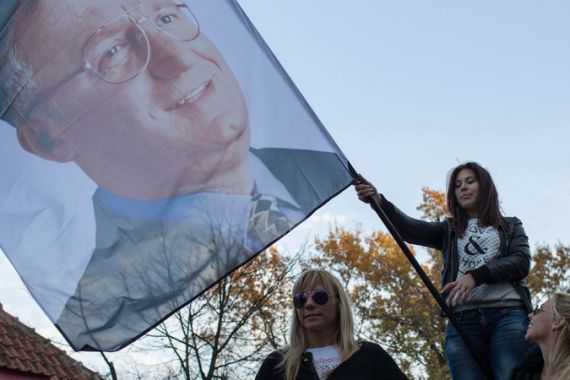Serb leader vows to defy war-crimes court
Vojislav Seselj says he will not return to The Hague if summoned after being released for medical treatment in Serbia.

Vojislav Seselj, the Serbian far-right leader, has said he will defy a UN war-crimes court if judges request that he return to The Hague, in remarks a day after returning home on provisional release.
Seselj, accused of recruiting paramilitary forces during the Balkan wars, returned home on Wednesday after the tribunal for the former Yugoslavia in The Hague, Netherlands, released him for medical treatment in Serbia.
Keep reading
list of 4 itemsICC prosecutors: Mali rebel ‘enthusiastic’ war crimes perpetrator
Ex-Kosovo president Thaci pleads not guilty to war crimes
Shireen Abu Akleh’s family submits complaint to ICC
He was granted his temporary freedom on condition that he doesn’t interfere with victims or witnesses and that he goes back if summoned.
But he said on Thursday that he “will not go voluntarily”.
“Why would I?” he said.
“I will not hide, but they will have to arrest me.”
“When they give orders to the Serbian Government, [Serbian President Tomislav] Nikolic and [Serbian Premier Aleksandar] Vucic will decide what do to. I will not run.
“That would be a historical paradox and a form of legal paradox that Vucic and Nikolic, associates in my war crimes and associates in crimes against humanity, have to extradite me. Do you think I would miss such a chance?”
Serbia’s obligations
Rasim Ljajic, president of the Serbian State Council for Cooperation with The Hague Tribunal, told Al Jazeera that the matter of Seselj’s return to The Hague was between the accused and the tribunal, as the state had fulfilled all that had been asked of it.
He said the tribunal had decided Serbia’s obligations only included not issuing Seselj a passport.
“No other obligations exist, which is somewhat of a precedent,” Ljajic said.
“In all other cases we were obliged to return the accused to The Hague, unless they return voluntarily. In this case, there is no obligation. Why not? That is a question for the Tribunal.”
Seselj, 60, said he had been planning revenge on sometime close associates, Vucic and Nikolic, but he had issued such threats at the time the Hague court had sought guarantees for his provisional release.
“Because my threat was successful, there is no revenge,” said Seselj, president of the Serbian Radical Party (SRS), at party headquarters in Zemun, near Belgrade.
Vucic and Nikolic were in the SRS until 2008, when they split with Seselj, forming the Serbian Progressive Party (SNS), which is currently the ruling party in Serbia.
“The Hague had had enough of keeping me there and they did Vucic a favour to delay my arrival until the end of the visit of Albanian premier Edi Rama,” Seselj said.
“The point of the Serbian Radical Party is the idea of Greater Serbia. If that idea was extinguished, what would we be doing on the political scene?”
‘Proud and happy’
Seselj repeated an earlier sentiment, saying he had been “proud and happy” to hear of the murder of then-Serbian premier Zoran Djindjic in 2003, calling him a “traitor, mafioso and dark chapter of Serbian history”.
In a statement, the Democratic Party (DS), of which Djindjic had been president, said Seselj’s comments were “monstrous”.
“Hatred, division, insults, disqualificationsa and appeals for public lynching are not something that has been unknown in Serbia since the time Seselj went to The Hague, as the political rhetoric that he had established stayed the main matrix for settling scores with political foes, even now when his pupils are in power,” the DS statement said.
Seselj said he was not aware of the fact, which he described as possible, that “the Americans were preparing a political execution” of Vucic.
“I have nothing to do with that,” he said.
He denied he had been temporarily freed so that the US could use him to destabilise the Serbian government.
“All those whom Americans themselves brought to power are now complaining, unlike me, who rejected an American offer in 1991 to be opposition leader. Now I am picking up where I left off in 2003,” Seselj said.
Serbian doctors who visited Seselj say he is suffering from colon cancer that has spread to his liver.
Destruction and terror
Seselj, who once said he would like to gouge out the eyes of rival Croats with a rusty spoon, had been in custody in The Hague since surrendering in 2003.
He was charged along with other Serbian leaders of the 1990s as part of a criminal plot to drive out non-Serbs using massive destruction and terror.
Seselj has pleaded not guilty to charges of crimes against humanity and violating the laws and customs of war in Croatia, Bosnia and Herzegovina and Vojvodina, but prosecutors have demanded a 28-year sentence.
Judges have delayed passing the verdict several times because of different legal obstacles.
Seselj said his political campaign will focus on “stopping any attempts to include Serbia into EU or NATO”.
Serbia’s current government is led by Seselj’s former top associates, who now support Serbia’s EU membership.